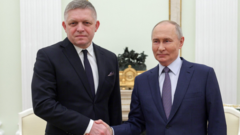In a surprising visit to Moscow, Slovak Prime Minister Robert Fico met with President Vladimir Putin, becoming one of the few Western leaders to do so since the onset of Russia's invasion of Ukraine. Fico, a known critic of the European Union's military support for Ukraine, emphasized the discussions surrounding Slovakia's reliance on Russian gas and the impending expiration of a crucial gas transit agreement with Ukraine.
Fico's visit deviates from the EU's collective stance against Russia, under which sanctions have been imposed in response to the invasion that began in February 2022. The prime minister has publicly stated that Putin has been "wrongly demonised" by Western nations, showcasing a potential shift in Slovakia's foreign policy that diverges from its EU commitments.
His meeting with Putin was part of a broader context where recent discussions about energy security in Europe have gained prominence. Following Fico's statements, it became evident that the Russian President was amenable to continuing gas supplies, depending on the resolution of the transit agreement with Ukraine, which Ukraine has indicated it might not renew.
This contentious visit has sparked backlash from opposition leaders within Slovakia, who argue that Fico's actions align the country too closely with Moscow. Some, like Czech Foreign Minister Jan Lipavsky, criticized the decision in light of Slovakia’s previous dependence on Russian energy, asserting that it undermines regional solidarity with Ukraine.
Supporters of Fico, including members from his Smer party and various government officials, defended the visit, arguing it was essential for negotiating favorable energy deals necessary for Slovakia's economic stability. Fico's recent reversal on military support for Ukraine reflects a broader policy change since assuming office again in October 2023.
As tensions rise, Fico maintains that he desires cooperative relations with Ukraine, presenting a contradictory stance to his visible alignment with Russia. The geopolitical landscape continues to evolve, with discussions among EU leaders highlighting the persistent threat that Russia poses and the urgent need to bolster defense strategies.
This visit underscores the complexities and divisions among EU member states regarding how to navigate relationships with Russia, particularly amidst the persistent humanitarian and geopolitical crises stemming from the ongoing war in Ukraine.
Fico's visit deviates from the EU's collective stance against Russia, under which sanctions have been imposed in response to the invasion that began in February 2022. The prime minister has publicly stated that Putin has been "wrongly demonised" by Western nations, showcasing a potential shift in Slovakia's foreign policy that diverges from its EU commitments.
His meeting with Putin was part of a broader context where recent discussions about energy security in Europe have gained prominence. Following Fico's statements, it became evident that the Russian President was amenable to continuing gas supplies, depending on the resolution of the transit agreement with Ukraine, which Ukraine has indicated it might not renew.
This contentious visit has sparked backlash from opposition leaders within Slovakia, who argue that Fico's actions align the country too closely with Moscow. Some, like Czech Foreign Minister Jan Lipavsky, criticized the decision in light of Slovakia’s previous dependence on Russian energy, asserting that it undermines regional solidarity with Ukraine.
Supporters of Fico, including members from his Smer party and various government officials, defended the visit, arguing it was essential for negotiating favorable energy deals necessary for Slovakia's economic stability. Fico's recent reversal on military support for Ukraine reflects a broader policy change since assuming office again in October 2023.
As tensions rise, Fico maintains that he desires cooperative relations with Ukraine, presenting a contradictory stance to his visible alignment with Russia. The geopolitical landscape continues to evolve, with discussions among EU leaders highlighting the persistent threat that Russia poses and the urgent need to bolster defense strategies.
This visit underscores the complexities and divisions among EU member states regarding how to navigate relationships with Russia, particularly amidst the persistent humanitarian and geopolitical crises stemming from the ongoing war in Ukraine.


















